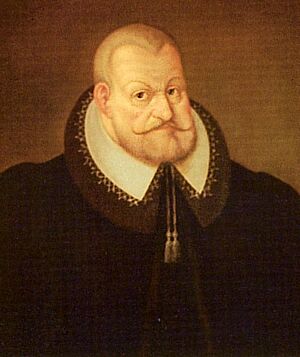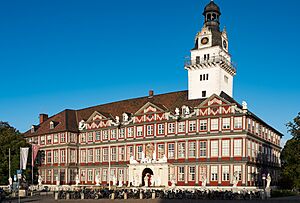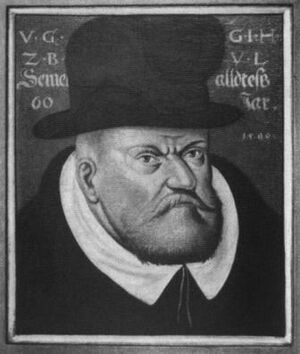Julius, Duke of Brunswick-Lüneburg facts for kids
Quick facts for kids Julius |
|
|---|---|
| Duke of Brunswick-Lüneburg | |
 |
|
| Contemporary portrait | |
|
|
|
| Reign | 1568–1589 |
| Spouse(s) | Hedwig of Brandenburg |
| Issue | |
| Sophie Hedwig Henry Julius Maria Elisabeth Philip Sigismund Joachim Charles Dorothea Augusta Julius Augustus Hedwig |
|
| Noble family | House of Welf |
| Father | Henry V, Duke of Brunswick-Lüneburg |
| Mother | Maria of Württemberg |
| Born | 29 June 1528 Wolfenbüttel, Duchy of Brunswick-Lüneburg |
| Died | 3 May 1589 (aged 60) Wolfenbüttel |
Julius of Brunswick-Lüneburg (born June 29, 1528 – died May 3, 1589) was an important ruler from the House of Welf. He was the Duke of Brunswick-Lüneburg and the ruling Prince of Brunswick-Wolfenbüttel from 1568 until his death. Later, starting in 1584, he also ruled the Principality of Calenberg.
Julius was a very influential duke in his time. He brought the Protestant Reformation to his lands. He also started the University of Helmstedt and made many helpful changes to how his government worked.
Contents
Early Life and Education
Julius was born in Wolfenbüttel. He was the youngest son of Duke Henry V of Brunswick-Lüneburg. His father was known for being a strong warrior and a devoted Catholic. Henry V had expanded his lands, but he also faced many conflicts.
Because Julius was a younger son, he was expected to become a church leader. He studied at universities in Cologne and Leuven. In 1550, he traveled through France on a "Grand Tour." During this time, he started collecting books. This collection later became the famous Herzog August Library in Wolfenbüttel.
In 1553, Julius was chosen to be the Prince-Bishop of Minden. However, he never got official approval from the Pope and resigned after just one year.
Becoming a Ruler
A big change happened for Julius in 1553. His father, Duke Henry V, was fighting in a war called the Second Margrave War. During a major battle, the Battle of Sievershausen, both of Julius's older brothers were killed. Suddenly, Julius became the next in line to rule.
His father was not happy about this. He thought Julius was too weak and liked French culture and the Protestant faith too much. Julius avoided arguments and went to live at Hessen Castle for a while. Since there was no way to stop him from becoming ruler, Julius took over the Principality of Wolfenbüttel when his father died in 1568. He then moved into Wolfenbüttel Castle.
Duke Julius's Reforms and Achievements
Julius proved to be a very skilled ruler. He quickly brought the Protestant Reformation to his lands. He also changed the tax system, which helped farmers have more rights. He created a local army where every household head had to own a weapon and train. He also improved the court system.
In 1569, Julius made an agreement with the city of Brunswick. The citizens recognized him as their ruler, though arguments between the Duchy and the city still continued sometimes.
Economic Growth
Duke Julius used a policy called mercantilism to boost trade and mining. This meant he focused on making his state richer by controlling trade. Copper and lead mining in the Harz mountains grew a lot, and many new mines were opened. Julius even wrote a book about how to use a type of soil called marl.
To help sell mining products, Julius improved roads and rivers. In 1577, the Oker river was made easy to travel on. This helped transport goods from the Harz mountains to Wolfenbüttel.
Education and Religion
On October 15, 1576, Julius officially opened the Academia Julia. This was the first university in his state, located in Helmstedt. Its main goal was to train Protestant church leaders for his newly reformed state. He wanted them to follow his Lutheran Church Order. As a Protestant prince, he also signed important religious documents like the 1577 Formula of Concord and the Book of Concord in 1580.
Building and Expansion
In 1581, Julius bought a beautiful palace called Ca' Vendramin Calergi in Venice, Italy. Venice was one of his favorite cities to visit. He paid a lot of money for it, but he sold it just two years later. Julius also hired a Dutch architect named Hans Vredeman de Vries to design a network of canals, called grachten, in his Wolfenbüttel residence.
Julius also expanded his territory. He gained Calvörde in 1571 and parts of the County of Hoya in 1582. When his cousin, Duke Eric II, died in 1584, Julius inherited the Principality of Calenberg.
Julius died in 1589. His oldest son, Henry Julius, became the new ruler.
Family Life
Julius married Hedwig (1540–1602) on February 25, 1560. She was the daughter of Elector Joachim II Hector of Brandenburg.
They had several children who grew up to be adults:
- Sophie Hedwig (1561–1631), who married Duke Ernest Louis of Pomerania-Wolgast.
- Henry Julius (1564–1613), who became the next duke.
- Maria (1566–1626), who married Duke Francis II of Saxe-Lauenburg.
- Elisabeth (1567–1618), who married two different dukes.
- Philip Siegmund (1568–1623), who became a bishop.
- Joachim Charles (1573–1615), who was a church official.
- Dorothea Augusta (1577–1625), who became an abbess (head of a convent).
- Julius Augustus (1578–1617), who was an abbot (head of a monastery).
- Hedwig (1580–1657), who married Otto III, Duke of Brunswick-Harburg.
 | Frances Mary Albrier |
 | Whitney Young |
 | Muhammad Ali |



